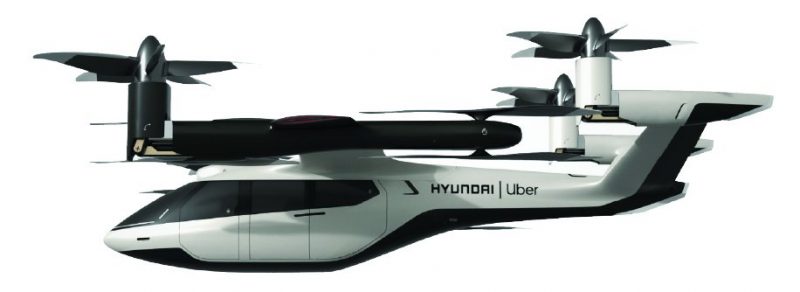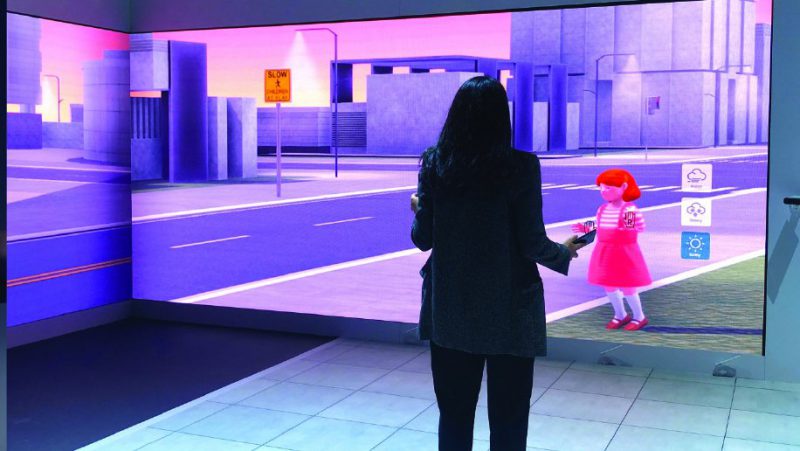Worlds Beyond
Conveniences connected or citizens surveilled? The future comes into focus at CES2020
January 30, 2020


CES, the annual Consumer Electronics Show, has been convening in Las Vegas for 53 years. Last month the show gave everything it had to 2020, although the focus was less on startling new gadgets that can pour your milk and empty the kitty litter, and more about applying these developing innovations to large scale infrastructure and operations.
On the docket were keynotes and sessions about the coming promise of 5G, autonomous driving vehicles (now tabbed “AVs”), the future in broad applications for AI and voice interactions with IoT (now not just the “Internet of Things,” but redubbed the “Intelligence of Things”), the future of retail and digital health, and what all this means within the new concerns exploding over privacy.
This year travel took the stage in a way it has never before at CES. Whereas in the past there was an announcement or two over some now technology-focused amenity in the travel space (for instance, Carnival’s Medallion amenity that was announced at the show in 2017), this year travel and tourism had a pavilion, several hard-hitting sessions and a keynote delivered by Delta Air Lines CEO Ed Bastion.

Endless Exuberance
Technology is gaining force as the industry of the future, and proving to be as tectonic as electricity, aviation and the portable gas-powered combustion engines that rocked the world a century ago. The connected digital world is seeing a record $422 billion in retail revenues in 2020 – and that’s in the US alone. According to the Consumer Technology Association (CTA), that’s an increase of nearly 4 percent over last year.
“More and more consumers are embracing the faster connectivity, advanced intelligence and seemingly infinite content that technology offers today – pushing consumer technology industry revenues toward another record-setting year in 2020,” says Gary Shapiro, president and CEO of CTA.
Software and Streaming Services (music, video and video gaming spending on software and streaming services is projected to reach a new high of $81.2 billion in 2020, an 11 percent boost over last year. Wireless earbuds or devices such as Apple AirPods and Samsung Galaxy Buds will help propel the category to nearly 67 million units in 2020, up 35 percent, earning $8.2 billion in revenue, an increase of 31 percent after a breakaway year of sales in 2019.
Smart Home sales – including smart doorbells and locks, WiFi cameras, smart thermostats, smart smoke and carbon monoxide detectors, and smart home security kits – are expected to reach 35.2 million units (15 percent growth) and $4.3 billion (4 percent increase).
“Connected intelligence defines today’s device ecosystem from consumer favorites such as smartphones and TVs to an expanding universe of smart home solutions making intelligent living spaces a reality,” says Steve Koenig, CTA’s vice president of market research. “Over the next 10 years, the dynamic of connected intelligence will grow apace with advancing 5G networks and innovative applications of AI to propel the consumer tech industry forward — and with it consumer experiences, safety, health and more.”
Rise of the Replacements
Replacement upgrades are fueling much of the growth as new chips and microtechnology leaves older devices wanting or irrelevant. Personal charging devices, for instance, are all type C-enabled now for faster charging experiences, leaving USB derivatives in the dust. One such experience with Eggtronic, a maker of cutting edge charging devices, left this writer in a lurch when trying to connect its newest device – the Sirius 65w that is the smallest and fastest-charging device out there – without a personal US C-enabled device to connect to it.
Here are just some of the upgrades that will be filling our homes and highways of the future, supplanting mountains of whatever we are using now:
•Televisions – TVs that expand to the size of buildings or that roll up, or disappear into furniture and art, or have deep crystalline resolution or allow you to speak commands to them from across the room.
•Earbuds – These now integrate noise canceling properties and are trying to fill a gap for consumers of a certain age who are not quite ready for hearing aids.
•Kitchen appliances – That know when you are out of a certain food and order it to be delivered for you, or take note of food in inventory and send recipes that can be applied for those.
•Pet devices – That allow owners to engage with pets remotely or monitor a pet’s mood or health with a touch device.
•Vehicles – Yes, we are inching toward personal drone transport.
As Samsung literally rolled out its latest home tech problem solver, Ballie, one had to wonder. The smart ball rolls around the floor following the owner or dog or whatever is nearby and responds to commands to turn on lights, open curtains, get the Roomba going or play with the nearest pet, all with cute sounds. And this was a key feature of the plenary delivered by Samsung president and CEO Hyun-Suk Kim.
There was buzz about the disappearing keyboard as voice AI takes over in the computing realm. Then there is the advent of smart underwear and a new revolution in personal gadgets. Biometrics, already in use as some airports, is going to be widely adopted and make TSA something to be managed in minutes rather than veritable blocks of time, with further applications in the medical field in remotely diagnosing and treating ailments. Shopping as we know it is also undergoing a tech revolution. The future for retail will be online in AI and VR shops that allow shoppers to try new looks remotely or test items out and order items from “B8TA” stores. These are already in action in key cities in the US.

Travel in a Connected World
As for travel, the big news at CES2020 was not the latest device as much as the latest app. Delta CEO Ed Bastion, wowed a packed ballroom with his vision of the future that will launch sometime this summer – an end-to-end solution to easing the pain of travel.
From a new app (yet to be debuted), passengers can request luggage delivery from home to hotel through new available in-app services. They can order a Lyft transfer to the airport, paid for with SkyMiles if desired, start watching flight entertainment on their smartphone along the way and pick up where they left off on their seatback screen inflight.
Once at the airport, the app connects their personal itinerary to Delta flight monitors so that passengers will see only the information that pertains to them in a sort of eerie “Minority Report” way (interactive signage is something we will see crop up in myriad creative ways over the next few years).
Passengers will be tracked through the airport en route to the gate and offered deals at various concessions they pass. They will be alerted when it is their time to board rather than compete for position in crowded lines. In the seat, they can order up snacks and beverages from their phone, pad or the seat monitor and even connect with other passengers on the plane. And, Bastion says, WiFi will be free for everyone.
“The future is multi-modal,” says Bastian. ““We see technology as a tool to further our mission of connecting people and creating opportunities,” he said. “We’re not chasing shiny objects or tech for the sake of being cool. We are dedicated to solving your travel problems and making your voyages – and your lives – easier.”
In travel-focused sessions at this year’s event, privacy was as much on people’s minds as new conveniences. Carnival Corporation discussed its ground-breaking Medallion (a take on Disney’s popular “MagicBands” concept) that utilizes many thousands of embedded sensors wired into the ceilings of ship decks that connect with each passenger’s Medallion. The system is now a go in the entire fleet of Princess cruise ships that each track some 3,000-plus guests as they navigate around the boat.
The data, says John Padgett, chief experience and innovation officer for Carnival Corporation, remains completely private within the ecosystem, never going out to a third party. And passengers do not have to use the Medallion, although “they nearly always decide to put it on and opt in a few days into the trip,” he says. The item, as big as a coin, unlocks stateroom doors, orders drinks and food, schedules services and dining, makes recommendations, and eases the embarking and debarking processes in each port.
Audrey Handley, president of American Express Travel, also addressed the privacy issue but noted only that all uses of member information would be transparent. The company introduced Mezi in 2018, a personal travel assistant powered by AI, which helps travelers avoid some of the time lost in planning flights, hotels and vacations. “We’re also a bank still, so we have a lot of regulation and oversight around the data and how it is shared,” says Handley. “So we are making sure that the customer’s needs and the customer’s requests are front and center.”
Jeff Kaelin, vice president of product development at Avis, agrees that data is, indeed, being collected and used, but added that the customer is meant to be the beneficiary. “We have more than 200,000 connected cars in our fleet and the primary use of data is to make [the customer’s] rental experience faster,” says Kaelin. “The important thing is access to this data and we take our customers’ privacy very seriously. Our stance has been about transparency. Tell the customers what information you are capturing, tell them explicitly what you will do with it, and tell them what you will not do with it – while looking for ways to enhance their overall experience.”
But data roams the world, not just the world of travelers, and with the continued layering of Smart Cities, Smart Vehicles, Smart Content and Smart Currencies, the topic looms ever larger. Tech giants Apple, Facebook, Google and Microsoft are looking to federal data privacy laws to carve a path to the future. To that end, the California Consumer Privacy Act (CCPA) that went in to effect with the new year grants consumers the right to know what information companies have on them and be allowed to be deleted or opt out of the sale of those assets.
Meanwhile, 5G is here, robots and surveillance cameras are proliferating and getting smarter, and CES is putting it all together in a mish mash of ever-more-flamboyant, crazy-making distractions and conveniences. The future is here. We are but tasked with opting in and enjoying the ride, or finding an off-the-grid perch where we can watch real sunsets and hear silence.




